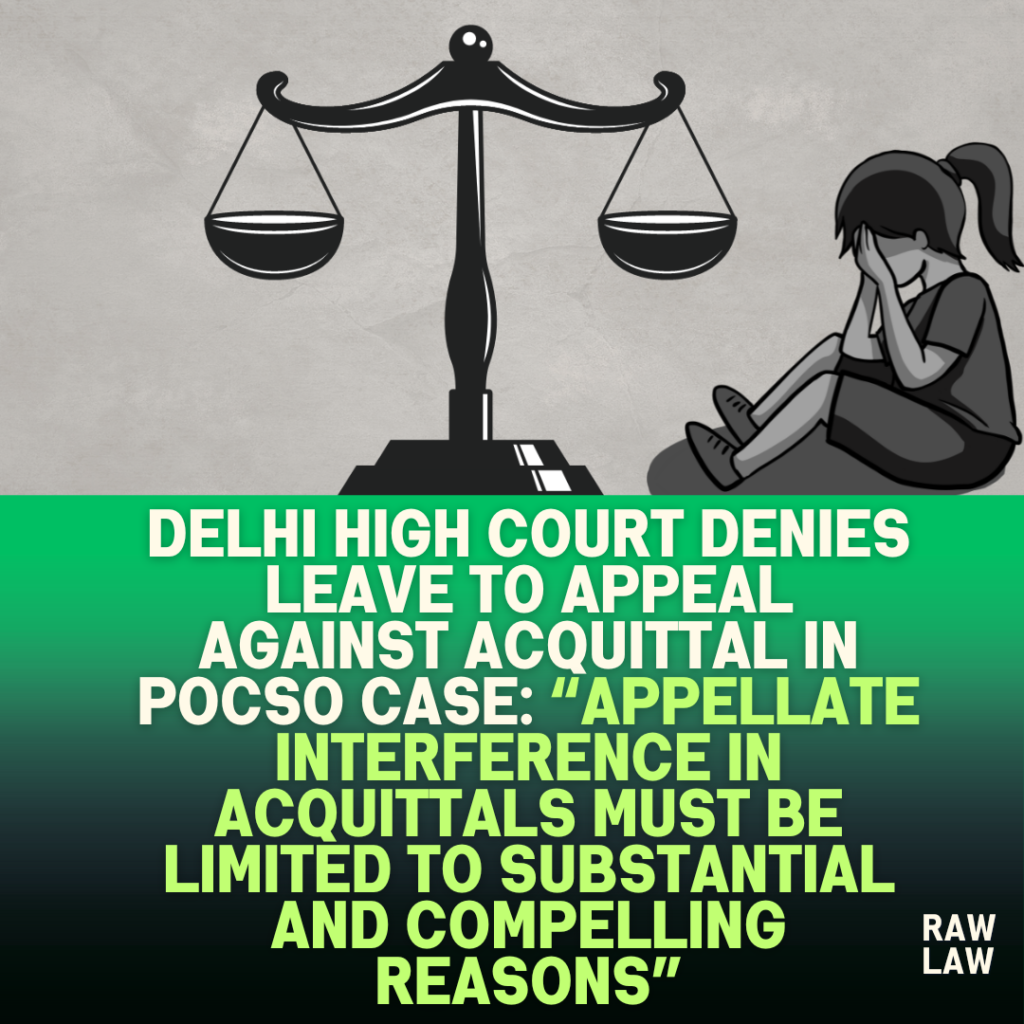Court’s Decision
The Delhi High Court dismissed the State’s petition seeking leave to appeal under Section 378(3) CrPC against the acquittal of the accused under Section 10 read with Section 9(m) of the POCSO Act. The Court observed that the prosecutrix’s testimony was inconsistent, her parents had turned hostile, and no corroborative medical or other evidence supported the allegations. Justice Amit Mahajan held, “The testimony of the prosecutrix is full of inconsistencies and the same does not inspire confidence. The benefit of the same has to go to the accused.” Accordingly, the leave to appeal was denied, and the petition was dismissed.
Facts
An FIR was registered at Police Station Chhawla based on a complaint by the prosecutrix’s mother, alleging that on 14.07.2016, the respondent had touched her daughter’s private parts with his finger and kissed her on the cheek. The mother informed her husband later that evening, who then dialled 100 to alert the police. The prosecutrix’s statement was recorded under Section 164 CrPC. Following investigation, a chargesheet was filed under Section 354 IPC and Section 8 of the POCSO Act. The trial court, however, framed charges under Section 10 read with Section 9(m) of the POCSO Act. The accused pleaded not guilty and claimed trial. In his Section 313 CrPC statement, he denied the allegations and asserted false implication.
Issues
- Whether the impugned judgment of acquittal by the trial court suffered from any perversity or illegality.
- Whether the inconsistencies in the prosecution evidence warranted interference by the High Court at the stage of leave to appeal.
- Whether the prosecutrix’s testimony, despite resiling during cross-examination, was reliable enough to merit reversal of acquittal.
Petitioner’s Arguments
The State, through the Additional Public Prosecutor, contended that the trial court failed to appreciate the consistent identification of the accused by the prosecutrix in her Section 164 CrPC statement and examination-in-chief. It was argued that although the prosecutrix resiled in cross-examination, such inconsistencies should not automatically entitle the accused to acquittal, especially in a sensitive case under POCSO. The APP emphasized that the Court ought to have relied on the initial statements of the child victim.
Respondent’s Arguments
The respondent submitted that the prosecutrix and her parents did not support the prosecution’s case during trial. The defence highlighted that both parents had turned hostile and denied any allegations of sexual assault. It was further argued that there was no medical evidence, and the trial court rightly noted the contradictions in the testimonies. The defence also brought in two neighbours as witnesses who confirmed that there was a dispute over water spillage and an altercation but denied any incident of sexual misconduct.
Analysis of the Law
The High Court reiterated the principle that appellate interference in acquittals must be limited to cases where there are “substantial and compelling reasons.” Referring to Maharashtra v. Sujay Mangesh Poyarekar, (2008) 9 SCC 475, the Court emphasized that while the threshold for granting leave to appeal is lower than setting aside an acquittal, the Court must still find that a prima facie case or arguable point exists.
The Court also acknowledged the established legal position that conviction can be based solely on the testimony of the prosecutrix if it is trustworthy (Moti Lal v. State of M.P., (2008) 11 SCC 20), but cautioned that such testimony must inspire confidence and be free from material contradictions.
Precedent Analysis
- Maharashtra v. Sujay Mangesh Poyarekar, (2008) 9 SCC 475: The Court cited this decision to underline that leave to appeal should only be granted when arguable points are raised and not routinely. It clarified that at the stage of leave, a detailed reappraisal of evidence is not required but prima facie merits must be evident.
- Moti Lal v. State of M.P., (2008) 11 SCC 20: Relied upon to affirm that the sole testimony of the prosecutrix can be the basis for conviction, provided it is credible and consistent.
In this case, the Court held that both these precedents did not aid the petitioner-State because of the major contradictions in the evidence of the prosecutrix and lack of corroboration.
Court’s Reasoning
The Court noted significant inconsistencies:
- The prosecutrix initially claimed that the accused touched and kissed her, later stating he licked her private parts.
- During cross-examination, she retracted and said the accused merely slapped her.
- Her parents contradicted the original complaint: the father denied any sexual assault being reported, and the mother stated the incident involved water being thrown and not sexual abuse.
- Both parents denied lodging any such complaint in cross-examination.
Further, no medical evidence or any other independent corroboration was presented. The defence witnesses confirmed a dispute over water but refuted any allegation of abuse. The Court found that these contradictions severely undermined the prosecution’s case.
Conclusion
The Delhi High Court concluded that the prosecution had failed to make out even a prima facie case to justify leave to appeal. The inconsistencies in the statements of the prosecutrix and the complete retraction by her parents during trial formed a weak foundation that could not support a reversal of the acquittal. As a result, the Court held:
“There is no infirmity with the impugned judgment… the State has not been able to establish a prima facie case in its favour.”
Accordingly, the petition for leave to appeal was dismissed.
Implications
This judgment reinforces the principle that courts must exercise restraint while interfering with acquittals, especially in sensitive cases under POCSO, where the prosecution evidence lacks consistency and corroboration. It affirms the importance of credible, consistent testimony and shows judicial caution in relying solely on resiled statements. The ruling also underscores that while child victim testimony can form the sole basis of conviction, it must be free of material contradictions and inspire confidence.



